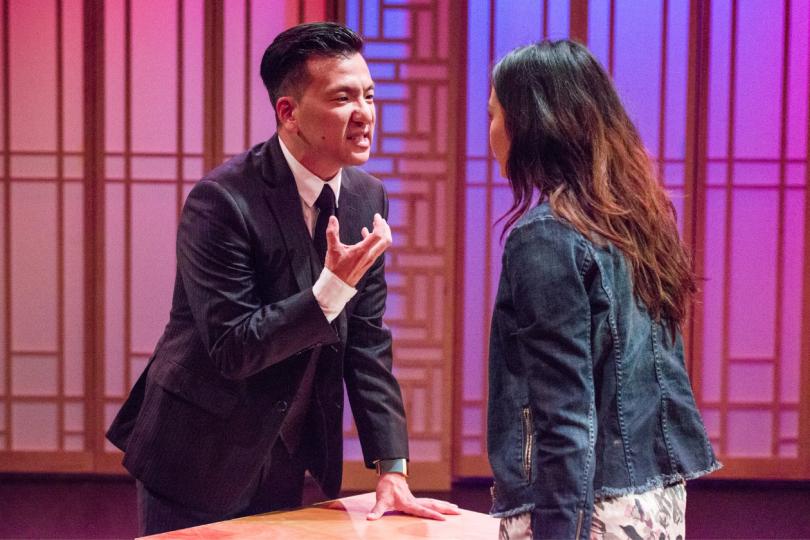Losing My Korean Drama Virginity

I can’t think of a better way for me to have lost my Korean Drama virginity than to May Lee-Yang’s witty and incisive script and Theater Mu’s loving attention to the right details.
The drama. The intrigue. The melodrama. The... ghosts? Theater Mu’s staging of May Lee-Yang’s new play The Korean Drama Addict’s Guide to Losing Your Virginity is funny. Very funny. Its playful but formally rigorous manner reinforces Lee-Yang’s goal to “write a love story that centers on two Asian people,” (Playwright’s Notes, Theater Mu Playbill, August 2018). The beauty behind The Korean Drama Addict’s Guide to Losing Your Virginity is that its medium is the message -- the melodrama, the dialogue, and the action are pulled from the artform it glorifies.
Tools from K-Dramas
I suspect that for lovers of Korean drama, this play must feel like Jane the Virgin did for me. (Considering that my Spanish has never been more than elementary I have watched an astonishing number of telenovelas). It manages to toggle between loving reference and outright snark, enjoying the eccentricity of the form while scrupulously plumbing its melodrama.
Our heroine Gao Hlee (Dexieng Yang), is a Hmong, midwestern personality coach who, as she nears her 30th birthday, realizes that she needs to lose her virginity and seriously consider having a baby. Egged on by her practical but romantic mother (Phasoua Vang), and cautioned and advised by her good friend Z (Khadija Siddiqui), Gao meets and (spoilers) falls in love with the gruff but ultimately good Korean businessman Benedict (Brian Kim). Their love story feels like a K-drama -- there are key moments of slow-motion action, boy-band-esque posing (complete with smoke machines and fans), over-the-top costumes in key moments, a dream sequence, even a soulful confession of love. Enjoyably, these elements are coupled with particularly sweet squeals of delight from Gao Hlee when elements of her life comport with the media she loves. The ever-changing ensemble enacts demonstrative scenes to give the audience a taste of different kinds of dramas. Coupled with some great zingers about midwestern sensibilities with Minnesotans squarely in the cross-hairs, Yang-Lee’s script cuts across the many social and cultural groups that make up the Twin Cities.
When Yang and Kim are on stage together their chemistry is real and authentic in both passionate and comedic scenes. Yang’s character is a bit whiny for me in the scenes with her mother (perhaps highlighting the more adolescent relationship she finds herself in at home), and Kim’s gruff acting at the beginning of the play is perhaps a bit much, but as the melodrama increases, their performances shine.
While Gao Hlee and Benedict are the main main characters of the piece, it is Clay Man Soo’s Secretary Kim that stole my heart and will remain the character I will think back to most. (What can I say -- I love the underdog in an old-fashioned love triangle: #TeamSpike, #TeamHector, #TeamJacob). The best thing about Secretary Kim is that he is an evolving protagonist as well, and not simply relegated to the position of emotionally-available love interest or sassy best friend. Lee-Yang writes him with humor and great clarity, building a character that gives Soo the ability to really chart Secretary Kim’s progression through the play. While Gao Hlee and Benedict go through a typical romantic journey (sexy disdain leads to unexpected vulnerability and reciprocated unexpected kindness leads to funny situational comedy leads to refusal of love leads to ultimate happy ending) Secretary Kim’s journey is more about discovering himself, regardless of whether or not his feelings are reciprocated in the way he would like them to be. There is a beautiful scene which you know Secretary Kim would like to end in a kiss, and it doesn’t happen. And he is perfectly ok with that, because he is growing to understand and know himself. It’s a stellar performance by Soo, and worth the price of admission in its own right.
It’s worth noting that I haven’t seen a play like this before, and that is part of the reason I liked it so much. As a cis, white woman I am conscious that so much of the theatre I consume is written and performed for me as a key demographic. There are references in this play that made the audience around me laugh uproariously that I still don’t understand: that’s a good thing. This play walks an incredibly difficult line, and I am thankful that the playwright wrote not only for the Asian (and specifically Hmong) communities in the Twin Cities, but generously wrote to include someone like me in on the action. She offers enough explanation along with inside jokes to put the whole audience at ease -- I felt like I was entering a conversation for the first time, but not excluded. It’s a testament to her writing, and the good pacing of the cast.
If you think it’s time for you to lose your virginity to the K-drama (and trust me, if you haven’t experienced one yet, then it is) go and see Theater Mu’s A Korean Drama Addict’s Guide to Losing Your Virginity, waiting for you at the Park Square Theater until August 19th.




